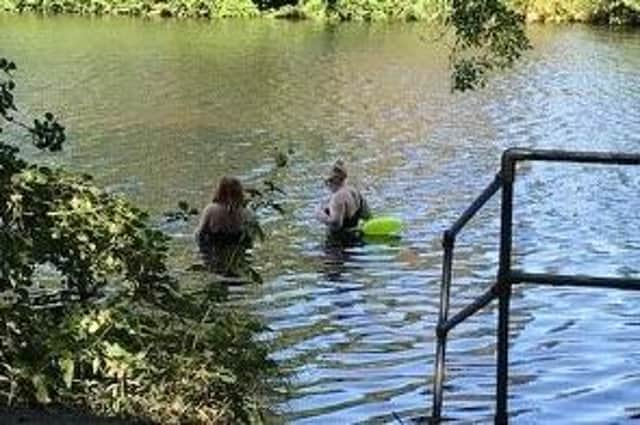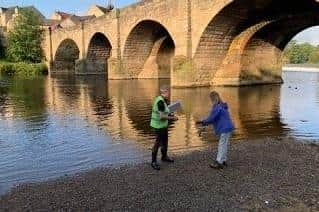Steps needed to clean River Wharfe in Wetherby


Penny Stables, of Boston Spa, Wetherby and Villages Green Group, said that findings of a report into water samples taken last August show an improvement in quality on the previous year.
“Although the water test results this year are surprisingly not as bad for Wetherby, Boston Spa and Tadcaster as last year, there are many factors that come into play,” she said.
Advertisement
Hide AdAdvertisement
Hide Ad“Firstly the quantity of water in the river affects the dilution of bacteria present in the river and also the flow will disperse it more quickly.


“This year although river levels were generally lower than in 2020, there had been significant rainfall the previous day, which may have impacted the results.
“The highest recording of eColi was at Flint Mill, which is close to a CSO (Combined sewage outlet), so this may have impacted the result, which as can be seen on the graph is above what is considered “safe” levels again this year.”
She added: “There is clearly a lot to be done before the River Wharfe is a clean river that we can all enjoy for swimming, paddling and recreation.”
Advertisement
Hide AdAdvertisement
Hide AdThe iWharfe citizen science project was designed in 2020 by the Ilkley Clean River Group, Yorkshire Dales Rivers Trust (YDRT), Addingham Environment Group, Dales to Vale River Network and the Environment Agency and involves charities and community groups.
Funding in 2020 was provided by local councils, charities and private donations. In 2021 funding was provided by the YDRT’s project WaterCog. Turn page 10
In 2020, the principal aim of iWharfe was to raise awareness about river water quality by showing how concentrations of faecal bacteria (of concern for human health) and nutrients (of concern for ecosystem health) varied along the river on a single day.
It was also designed to identify sources of faecal contamination by sampling upstream and downstream of potential pollution sources including Sewage Treatment Works (STW) and selected tributary becks.
Advertisement
Hide AdAdvertisement
Hide AdIn 2021, almost exactly one year later the river was surveyed again in the same way but samples were only collected from recreational sites.
They were analysed at the ALS Ltd laboratory in Coventry for E. coli.
The report said: “Our specific objective in 2021 was to assess the potential exposure of the general public using the river for recreation to a health risk from faecal pathogens on the day of sampling.
“As faecal bacteria concentrations vary greatly from day to day depending especially on river flow, many samples collected over the year are needed before a bathing water status can be safely established.”
Advertisement
Hide AdAdvertisement
Hide AdThe report adds: “E. coli concentrations at all recreational sites from East Keswick to Tadcaster were low in 2021.
“This is a somewhat surprising finding as impacts from the STWs serving Wetherby, Boston Spa and Tadcaster were expected.
“The rainfall that occurred on the previous day may have been less intense in these lower stretches of the river and/or higher river discharge volumes may have been effective in diluting point source inputs of faecal bacteria.
“However, the relatively high value at Flint Mill may have been due to the influence of the Wetherby STW, a short distance upstream.”
Advertisement
Hide AdAdvertisement
Hide Ad“We recommend that recreational sites along the Wharfe continue to be surveyed on an annual basis using this citizens science approach both to highlight the problem of faecal contamination at recreational sites and to characterize patterns of contamination under different flow conditions.”
Yorkshire Water told the Wetherby News that it is committed to water quality improvements.
A spokesperson said: “We have formed a partnership with other key stakeholders in the region and are committed to delivering water quality improvements on the River Wharfe.
“This will not be a short-term fix and will require significant investment as well as multiple agencies working together closely to play their part in achieving our aims.
Advertisement
Hide AdAdvertisement
Hide Ad“We are committed to further improving the environmental performance of our wastewater assets and pollution in rivers is not something that we or our customers want.
“We take our environmental responsibilities very seriously and making improvements in river quality is a key priority in our future plans, which includes further efforts to reduce intermittent discharges from CSOs.
“We are calling on Ofwat to let us invest more in this over the next five years to meet demand from our customers to reduce discharges.”